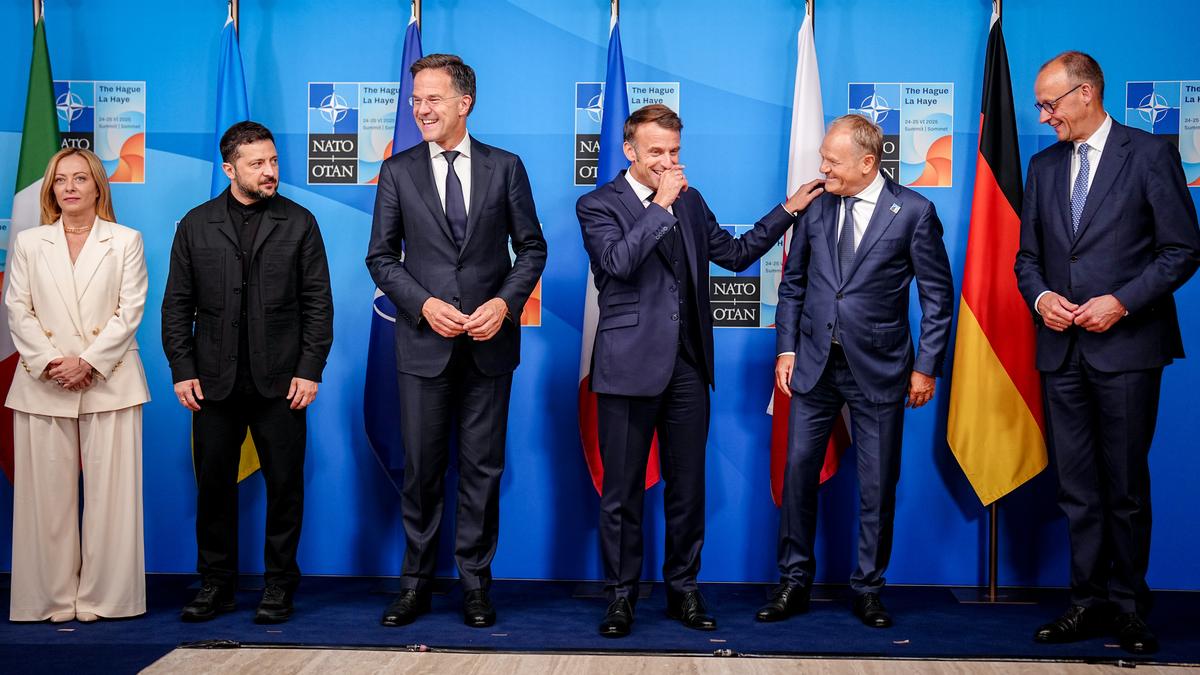Nato leaders agreed to increase defence spending to 5% of GDP and renewed their “ironclad commitment” to mutual security in an historic move to push back against an increasingly belligerent Russia.
The decision from the North Atlantic Treaty Organization’s 32 members at their high-stakes summit in The Hague is a major win for Donald Trump who has repeatedly lambasted his European allies for underspending on security.
But it was also a victory for his European allies and the alliance’s secretary general, Mark Rutte, who had worked for months to ensure the US renewed its Article 5 commitments on collective defence.
Luxembourg’s Prime Minister Luc Frieden gave his backing to the move in a statement issued by the government on Wednesday.
“Ensuring our common security is essential to maintaining our peace, our freedom and our way of life,” he said.
“Today’s decision, supported by all the Allies, must be implemented flexibly and at a progressive pace over the coming decade. It will be a matter of strengthening our security while ensuring economic and social benefits for Luxembourg citizens and businesses,” Frieden added.
US pressure
Trump, a longstanding sceptic about US spending on European security, had voiced doubts about how far he would be willing to honour those obligations on during his flight to The Hague. But he later said that discussions with other leaders had changed his view.
“I left here differently,” he said at a press conference following the summit. “It’s not a rip off and we’re here to help them protect their countries.”
The agreement is a landmark moment for an alliance which has been reinvigorated since the Russian invasion of Ukraine in 2022 forced leaders across Europe to dramatically reassess the threat they face from Moscow.
With all 32 members on track to meet the previous 2% target for the first time ever this year, the new goals promise to transform Europe’s militaries and the security architecture of the continent.
Germany, which has historically been reluctant to spend on defence, is engaged in the most dramatic shift, with Chancellor Friedrich Merz promising to build Europe’s most powerful conventional military.
“This is a memorable day that will certainly go down in Nato history,” Merz said. “Looking at Moscow in particular shows what we have in Nato: We must not simply take freedom, peace, security for granted.”
Also read:Nato should not focus exclusively on Russia threat, says Frieden
Unclear if targets will be met
Whether all member states eventually reach the spending goals agreed on Wednesday remains an open question.
Spain and Slovakia have already raised doubts about allocating that much money on defence and the targets themselves give countries a lot of leeway in how they measure their military expenditures.
US President Donald Trump at a press conference at the Nato summit on Wednesday © Photo credit: Sean Kilpatrick/Canadian Press v
Spain, the most conspicuous holdout on the 5% target, drew the ire of Trump for its stance. The US president said that he would impose tougher trade terms on Spain as a result.
“They want a little bit of a free ride,” he said. “We’re going to make Spain pay twice as much.”
The declaration endorsed at the two-day summit in the Netherlands states that allies “remain united and steadfast in our resolve to protect our one billion citizens, defend the Alliance, and safeguard our freedom and democracy.”
“Together allies have laid the foundation for a stronger, fairer, more lethal Nato,” Rutte said at a news conference after the meeting.
The declaration said the new target, which will mark an increase from the current spending goal of 2%, comes in response to “profound security threats and challenges, in particular the long-term threat posed by Russia to Euro-Atlantic security and the persistent threat of terrorism.”
Kremlin threat
Rutte has suggested that the Kremlin may be in a position to consider an attack on the alliance within five years.
The declaration affirms Nato’s support for Ukraine, while omitting last year’s statement that the country’s future is in the alliance, reflecting the Trump administration’s growing reluctance to provide more military assistance to Kyiv.
The US president met with President Volodymyr Zelenskiy on Wednesday on the sidelines of the summit as Kyiv seeks to buy more US weapons.
UK Prime Minister Keir Starmer told reporters that the mood of “pretty well all participants” in the session was that “we need to now push harder on Ukraine” and that it was time for Russian President Vladimir Putin “to come to the table.”
European leaders have repeatedly tried to convince Trump to crank up the pressure on the Kremlin since he took office earlier this year with a promise to deliver peace within his first 100 days. But the US president has disengaged after publicly musing about whether he’s being strung along by Putin.
The new spending target, which breaks down into 3.5% for core defence spending and additional 1.5% in related investment including infrastructure and cybersecurity, has come after months of coaxing by Rutte and will open the floodgates for trillions of dollars in defence expenditures until 2035.
The new ambitious pledge also comes at a time when many European countries are already grappling with high public debt levels. Some of them, led by Spain, questioned whether they will need to spend so much to meet the new ambitious lists of weapons and troops that each needs to provide as part of its Nato commitment.
The allies have agreed that “the trajectory and balance of spending” will be reviewed in 2029. Direct contributions toward Ukraine’s defense will also count toward their military spending, according to the declaration.
(With additional reporting from Michael Nienaber, Milda Seputyte, Josh Wingrove, Katharina Rosskopf, Andrea Dudik, Daryna Krasnolutska, Dasha Afanasieva, Suzanne Lynch, Meghashyam Mali and Alex Wickham)
(This article was originally published by Bloomberg and updated by the Luxembourg Times at 18:10 on 25 June 2025 with additional comments from Luxembourg Prime Minister Luc Frieden in paragraphs 4-6)
©2025 Bloomberg L.P.
